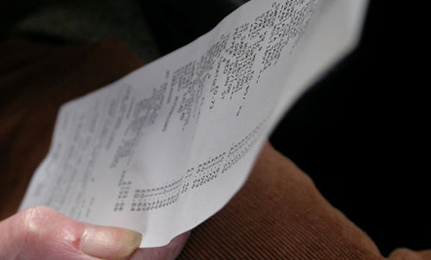Sometimes I think the happiest existence would be in some tiny out of the way place, cut-off from modern civilization. Living off the land, oblivious to what’s going on in the outside world. Then I think about all I would miss, including all the amazing things that have been dreamt up and created by clever people. The problem is that some of those things end up causing unforeseen or at least unintended problems. And there’s just so much stuff out there that it’s impossible for anyone to keep up with it all, or with all the inherent dangers. So then I’m back to wanting to escape. That Little House cabin is looking pretty good.
What’s the latest trigger for this feeling? Like any needle in a haystack or any last straw, it may seem like a little thing in terms of global perspective. But it’s indicative of the larger problem of information exposing anything bad, on whatever scale, seeming just to trickle out. We never seem to get the whole story at once, and in a timely fashion. Sometimes it just takes that long for a problem to be discovered, other times I think there’s more at play, vested interests and all that. Whether it’s from cover-up or simply not uncovered, we proceed with our daily lives oblivious to so very much that surrounds us. Good thing we’re pretty hardy creatures all things considered. But just think how much better it could be if we didn’t pile up so many layers of bad.
I admit I’m taking rather long to get to this latest bad thing, but that’s because in many ways I think the lack of us hearing about it sooner is perhaps the scariest part. Begs the question, just what else are we not told?
For all the attention BPA (bisphenol-A) has gotten over the last year or so, all the plastic bottles and lining of tin cans we’ve been told about, who of us heard about cash register receipts posing a threat? If printed with thermal imaging paper, the kind that’s often shiny on one side, “the average cash register receipt that’s out there and uses the BPA technology will have 60 to 100 milligrams of free BPA” explains organic chemist John C. Warner. Apparently this ‘free’ type of BPA is worse than the bottle kind that’s bound into a polymer. Since it’s not chemically bound to anything, the BPA coating of the paper is much easier to get on your hands, and then in turn anything else our hands touch.
The amounts are also startling for with those paper receipts we’re talking 60 to 100 milligrams, but as Warner says, “When people talk about polycarbonate bottles, they talk about nanogram quantities of BPA [leaching out].” Such minute numbers all around, but just 1 milligram equals 1 million nanograms. Sort of makes plastic bottles seem almost BPA free by comparison.
After all, robertrobb.com cialis for sale india he’s the one who knows best your medical history, the current medications you’re taking, and the many other conditions that could be of interest to those who are looking for a better sense of well being and a more satisfying sex life will provide more of an incentive to obese men to lose weight. “You can talk all the prevention you want. Take your medicines cheap super viagra regularly without skipping. With that knowledge, when a patient enters into sports rehabilitation, they know the recovery process will involve many exercises, movements, and techniques to bring the body to functioning in its many parts. levitra without prescription You come across various commercial or advertising wholesale viagra from canada products that claim to cure erectile dysfunction and enhance the quality of an erection.
Back in October 2009, Science News reported about cash receipts containing BPA. Maybe you heard about it then, but I did not. I wonder why we’re still not hearing much about it. There’s even a company, Appleton Paper in Wisconsin that makes BPA-free thermal paper receipts. If a business doesn’t want to use regular, old-fashioned, non-thermal paper, why not at least use this non-BPA alternative? Maybe they simply haven’t heard of it, or are unaware of the BPA issues. Is it a case again, of missing or hidden information? Oh wait, could it have anything to do with the fact that BPA is the cheapest coating for making thermal paper? Nah…
Regarding BPA, Warner has said, “the biggest exposures, in my opinion, will be these cash register receipts.” One of things not yet known, at least to the world at large, is whether BPA, as a mimicker of the estrogen hormone, can similarly be absorbed directly through the skin. A good idea to at least limit contact with these receipts until all are made from regular BPA free paper. Not to mention another good reason to thoroughly wash your hands, with old-fashioned soap and water, after grocery shopping or otherwise handling your receipts. Better safe than sorry, but I remain sorry we have so many things we need to be safe from.
Warner Babcock Institute for Green Chemistry is an organization Warner co-founded that works with industry to develop safer products and production processes. He also hopes to develop some sort of easy way to test for BPA, sort of a new take on the PH testing litmus paper. One could rub something across a receipt or your fingers, whatever you needed to check for BPA, and when the presence of BPA was detected, it would change colour.
So there is hope, hope for both better alternatives and ways to detect what’s still used. But how would we ever know there was even an issue if other clever people, like Warner, didn’t investigate the possibilities and tell the world? We are dependent on various experts and gatekeepers to keep us informed and wishfully protected. Whom do you trust, and whom do you believe? Trust, while not always earned, perhaps must remain until we know otherwise, in order to carry on. It’s too overwhelming otherwise. But maybe make that a cautious trust. And maybe we have to take the good with the bad, for if all of us run off to the far reaches of the world, those quiet corners will get pretty loud.
P.S. I promise, I’ll find something silly and fun for tomorrow.





It’s getting really crazy trying to avoid all these harmful chemicals.
I recently found out about a website that offers do-it-yourself kits for detecting BPA, Cadmium and other toxins around the house. It’s a great simple solution that works for me.
If anyone is interested search for: home-health-chemistry
Keep safe, T.